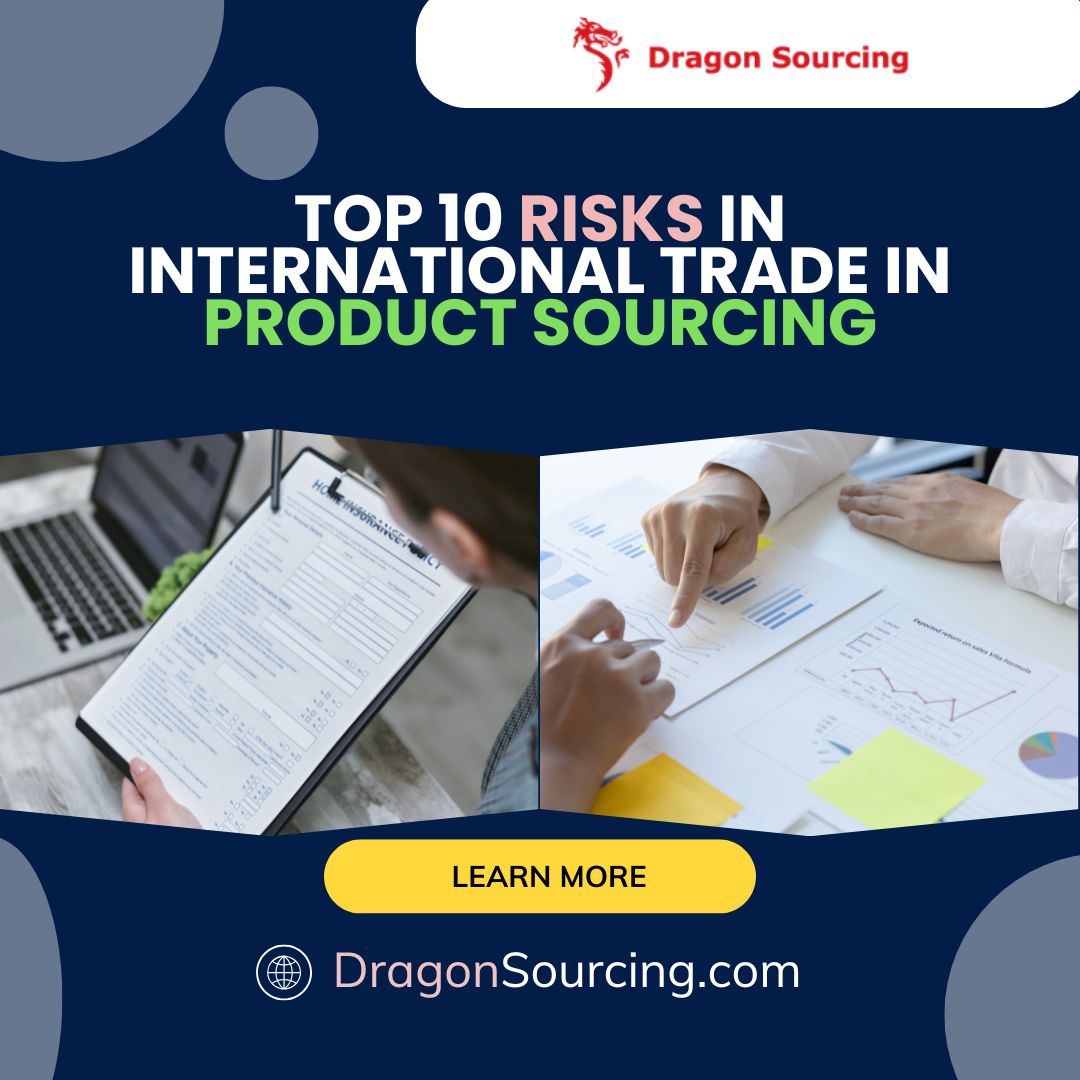
Summary:
The blog post highlights the top ten risks in international product sourcing. Political and geopolitical instability, currency volatility, supply chain disruptions, and regulatory compliance challenges can all derail procurement. Quality control lapses, intellectual property (IP) threats, and cultural or communication barriers create mistrust and inefficiencies. Logistics obstacles and transportation delays further complicate operations, while financial and payment vulnerabilities expose businesses to fraud. Finally, neglecting sustainability and ethical sourcing harms brand reputation. Effective mitigation involves partnering with reputable sourcing firms, enforcing audits and strong contracts, and leveraging local insights for smoother global trade.
Top 10 Risks in International Trade in Product Sourcing
Introduction
International trade comes with pros and cons; on one hand, it helps the companies open up and expand into various markets, but on the other hand, it also makes the company more vulnerable to unknown risk. Companies should always be aware of the risks involved in a particular market and collaborate with the product sourcing company to keep potential risks at bay.
1. Political and Geopolitical Instability
Trade wars, unprecedented economic sanctions, political turbulence, and policy disruptions can bring all kinds of sourcing operations to a halt. Business houses need to have foolproof and dynamic strategies that take into account the causes of disruptions in politically turbulent areas.
2. Currency Fluctuations
Frequent ups and downs in the foreign exchange rate can have ill effects on the procurement process as a whole. Hedging and making sure that you have access to adaptable and flexible contracts are a must.
3. Supply Chain Disruptions
There are a number of disruptive factors, like political turbulence, natural disaster, or social unrest, which can make sourcing activities come to a standstill. Diversifying the supplier base will keep operations afloat.
4. Compliance and Regulatory Risks
Various nations have a variety of rules and regulations on customs, imports, and exports. These rules can backfire if not complied with.
5. Quality Control Issues
Working with suppliers from different countries often poses the risk of poor quality. This can be eliminated through thorough audits and inspections.
6. Intellectual Property Risks
Circulation of counterfeit goods and IP robbery are major issues associated with international trade. Contracts with clear conditions and legal provisions must be utilized to protect innovation.
7. Cultural and Communication Barriers
Linguistic and cultural barriers can sometimes prove to be a hindrance while working towards striking a deal. Collaborating with local experts and product sourcing companies helps to mend their differences.
8. Transportation and Logistics Challenges
International operations often face sudden changes in delivery times, unexplained delays, and high costs; therefore, expert logistics agencies can help to reduce these risks by ensuring several passages.
9. Financial and Payment Risks
Suppliers may ask for advance payments, which might make businesses too vulnerable to scammers. Therefore, it is highly recommended to opt for the most secure payment method to avoid such occurrences.
10. Sustainability and Ethical Sourcing Risks
The consumer today is conscious and bats for ethical compliance. Falling short of such standards can have ill effects on the image and reputation.
Conclusion:
The above-written risks are jotted down and explained so that the business houses stay vigilant about the do’s and don’ts. Getting on board with the leading product sourcing professionals or companies can help to eliminate or at least minimize these issues and pave the way for stronger business.
Frequently Asked Questions
Q1. Why is international trade risky for products?
It is risky because a lot of uncontrollable external factors, like policy shifts and social unrest, might take a toll on the profitability of the business.
Q2. How can companies reduce quality risks in global sourcing?
This can be done by conducting thorough audits and examining quality control through experienced partners.
Q3. What role does a product sourcing company play in reducing trade risks?
They are the ones responsible for smooth functioning of the operations by vetting, compliance checking, and logistics checking.
Q4. Are small businesses equally exposed to these risks?
Yes, small businesses also have to deal with risky affairs due to their financial limitations, but they can optimize their operations through procurement partners.
Q5. How important is sustainability in product sourcing today?
Sustainability is here to stay, and since it is ethical, both consumers and regulators opt for it.
Resources
- World Trade Organization – Trade and Compliance
- International Trade Administration
- Chartered Institute of Procurement & Supply (CIPS)
- Harvard Business Review – Global Supply Chain Articles
Author’s Bio:
Pankaj Tuteja
Head of Operations – India
https://www.dragonsourcing.com




